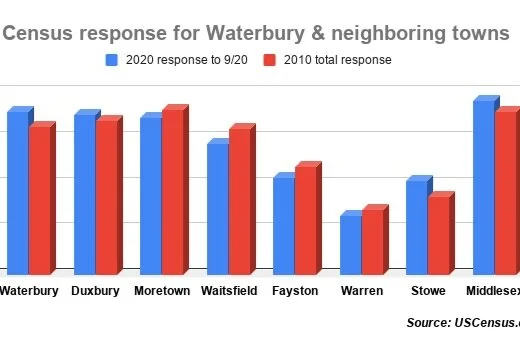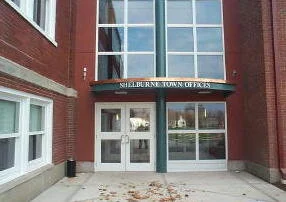Shelburne workers on COVID coping
Staffers reflect on the pandemic so far
Nearly six months since shutting down, Shelburne municipal staff have continued working, albeit with major changes to their day-to-day. The town has seen just 14 coronavirus cases since March 9, according to the Vermont Department of Health, and town staff shared how their work has been different in order to help keep the community safe.
Lee Krohn. Courtesy photo.
Lee Krohn, Town Manager
“I think we were probably the first in the county to close town buildings and stop holding in-person meetings,” Town Manager Lee Krohn said. “I don’t say that to praise ourselves or say we’re good or better than anyone else. It was just that we took pretty quick steps to do that.”
A central challenge, he said, was to stay in touch with the community — without meetings — to keep Shelburne residents informed about what the town was doing and to continue the work of town boards in a way that was open to the public.
“Once the selectboard started meeting … the floodgates opened,” he said. “Everybody wanted to meet again.”
Krohn quickly adopted Front Porch Forum as a way to keep residents in the know about changes in town regulations and restrictions.
“I’ve tried hard to keep the community informed every step of the way — [to say for example] ‘We’re taking this action this week, we’re considering a mask amendment,’” he said. “We’re doing our best to be helpful.”
Krohn said the hardest part has been managing people’s expectations.
“People still want everything to happen normally and all of their issues to be resolved rapidly, even in the midst of having to manage all the normal town affairs and then complicated by the pandemic,” he said.
He added, “I’ve felt very strongly that if you build positive working relationships with your staff and your community, then when something challenging arises, everybody will work with you to do whatever needs to be done.”
Diana Vachon. Courtesy photo.
Diana Vachon, Town Clerk
Stepping into the town clerk’s office, you’ll find huge sheets of plexiglass, hand sanitizer and Diana Vachon standing behind the counter with a mask — likely with a smile behind it.
In normal times, the clerk’s office can see a steady stream of visitors checking land records, obtaining dog licenses, registering to vote and consulting the clerk on other town services. Closing the office and working from home was a blow.
“When you’re a public servant and suddenly there’s less public, it’s like, wow, how do I find new ways to connect and see how people are doing and what they need,” Vachon said.
Fortunately, Shelburne’s land records are online so Vachon and her colleagues were able to work from home until they were able to return to the office at the end of May.
“It was good to see a face other than the ones that you live with,” Vachon said, laughing. As a COVID precaution, the office continues to ask visitors to make an appointment before coming in, to ensure that there are a limited number of people inside at all times.
Vachon’s single biggest job during the pandemic was directing the primary election on Aug 11.
Many of her co-workers are elderly or have family members with health issues, so they were not able to help with the election as they normally would. As a result, Vachon had to recruit new volunteers and train each poll worker individually over the phone because she was not able to hold in-person workshops.
“Pulling off an election during a pandemic was a lot of stress,” she said. “It was a lot of work. There were a lot of changes and things to adapt to.”
On primary day, 500 masked individuals walked through the doors to vote in person. Nearly 90 percent of Shelburne voters used mail-in ballots.
She said the pandemic has taught her to be more flexible and adapt to an environment that is constantly changing.
“I definitely strengthened those skills and having compassion for other people, more patience and being open to new and creative ideas. Really have a can-do attitude,” Vachon said.
Jerry Storey. Courtesy photto.
Jerry Storey, Selectboard Chair
Jerry Storey had one clear priority for town government as the pandemic crashed down on Vermont in mid-March.
He remembered saying to Krohn that everyone would need to stay employed and get paid.
Storey is no newcomer to town government issues. He was a town manager himself for many years in Maine and has served on the Shelburne selectboard for five years, three of them as chair.
Early on, Storey said, he and his colleagues realized that the town was going to have to deal with public health and safety issues, the economic impact on local businesses and the problem of food insecurity.
“We forged a much closer relationship with the Shelburne Business and Professional Association. We reached out to our local businesses on a number of occasions, seeking to help in whatever way we could,” Storey said.
Storey said that the town considered raising funds to help local businesses before federal and state government developed similar programs.
The town decided to delay the due date for property tax payments from July 15 until Sept. 15, to help with the financial blow COVID-19 struck at many families, Storey said.
He praised Shelburne Community School, the Shelburne School District and Shelburne Food Shelf for establishing a program for free meals throughout the summer.
“I think people were a little surprised when the figures were released about how many kids were getting these meals,” Storey said.
Storey has been conducting the twice-a-month selectboard meetings through Zoom, but remains uncertain how the town will be able to hold a virtual town meeting since it is normally attended by a large number of people.
“I know Zoom isn’t everybody’s cup of tea. Anybody involved will tell you that they missed the personal interaction, looking out and seeing someone’s face and saying hello,” Storey said.
Chris Carlson. Courtesy photo.
Chris Carlson, Water Department Staff
Chris Carlson was considered an essential worker at the Water Department in Shelburne when COVID-19 hit Vermont.
Carlson has worked for the town of Shelburne for 22 years, three years with the highway department and 19 years with the water department. His duties include checking the security of water tanks, checking chlorine residuals, making sure that the water is safe to drink and keeping up with the overall maintenance of systems.
“We stopped pretty much all customer contact and we started working one-person shifts. All we focused on was checking the water tanks, checking the water and then we went home,” Carlson said.
Carlson said the hardest part for him was listening to the news and not knowing what to believe or what was true.
“Back then it was scary. Nobody really knew what to believe. Are we going to be wearing face masks and be afraid of every cough and sneeze forever?” Carlson said.
Carlson and his team are now back to full shifts, but with precautions, including wearing a mask at all times, eating lunch separately and rigorous cleaning.
He said he has learned to take every day for what it is and to not live life afraid.
“We’re back to what we’ve done for the last 19 years. It’s nice to have a little bit of normalcy,” Carlson said.
Chris Robinson, Wastewater Superintendent
Chris Robinson. Courtesy photo.
As wastewater superintendent and chief operator of the sewage treatment plant, Chris Robinson hasn’t been able to work from home. He and his crew had to figure out how to keep two workers at each of the town’s two plants, doing their jobs while keeping them completely separate from each other.
“It’s hard to stay distant when you physically, in order to do your job, have to be holding on to something at the same time another person is holding on to it to work on a pump,” Robinson said.
Robinson said that his team found it difficult to complete some projects that were under contract because they were not able to go and knock on people’s doors and go into customers’ homes.
He has found some positive impacts from the pandemic, though.
“Being able to sign things electronically really helps you become more efficient at your job. I think it’s helped push us into a more digital world of electronics and stuff like that,” he said.












